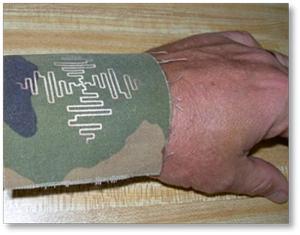Dec 13 2013
From toys and games, freshness sensors, body media, and medical devices to applications in outer space and high speed communications, flexible and printed electronics are changing the ways companies develop advanced products and packages to better serve their customers and gain a competitive advantage.
To speed adoption of these technologies into a broad range of industries, FlexTech Alliance today announced the formation of Users Groups focused on two general application areas: Wearable Electronics and Disposable Electronics.
 Wrist Antenna: Printing Electronics on Clothing Allows for Lighter, more Ubiquitous Communications Capabilities. Courtesy, US Army (PRNewsFoto/FlexTech Alliance)
Wrist Antenna: Printing Electronics on Clothing Allows for Lighter, more Ubiquitous Communications Capabilities. Courtesy, US Army (PRNewsFoto/FlexTech Alliance)
These groups will open the doors to a library of integration knowledge on cutting-edge flexible and printed electronics manufacturing techniques and solutions to challenges that always occur when new ideas are applied to practical implementation. The Users Groups will promote exchanges of ideas on technology roadmaps and experiences in fielding products, create dialog with supply chain companies, and facilitate pre- and non-competitive collaboration on promising technical developments.
Why Flexible and Printed Electronics
"Cutting edge brands and users including GE, P&G, Bemis, adidas and Lockheed Martin have publicly addressed or otherwise expressed interest in integrating flexible and printed (FPE) into new wearable and disposable products, including product packaging," FlexTech CEO Mike Ciesinski pointed out. "Creating a forum to listen to these and other leaders is essential to accelerate the successful integration of FPE into the widest range of industries possible. FlexTech invites all users - including some that have never considered this type of technology - to take a look at what we are going to accomplish with these users groups."
Flexible electronics are already incorporated into textiles, building materials and other surfaces, like clothing that adapts to wearers' needs and monitors physiology. In the near future these applications will create ubiquitous, human-scale environmental intelligence significantly affecting all of our lives. Today, printed electronics use existing graphics industry manufacturing capacity to produce square miles of circuitry at high speeds and vastly reduced costs that can be printed with nearly any method. Feature sizes in the 10-20 micron range make this the same as or better than microprocessors of 20 years ago. These disciplines have combined and continue to evolve as an entire new electronics sub-category: flexible and printed electronics (FPE).
NanoMarkets forecasts a $1.15B printed electronics market in 2014 growing to $16.7B in 2019, a 58% CAGR. Existing and near-to-market applications include smart tags and labels, wearable biomedical sensors and imagers, printed batteries, printed displays, and printed toxicity and structural sensors.
How to Participate
To prepare for the Users Groups launch and program, FlexTech is issuing a user survey. Results will be presented and discussed at the initial meeting, scheduled for February 6, 2014 in Phoenix, Arizona. Companies interested in the Users Groups are invited to take the survey at http://svy.mk/1clAh8j. For additional information and a User Group Prospectus, contact FlexTech at 1.408.577.1300 or email [email protected].
About FlexTech Alliance
FlexTech Alliance is a membership organization promoting the growth and success of the flexible and printed electronics industry through education and networking, evangelization and support for applied R&D. FlexTech coordinates collaboration between and among industry, academia, government, and research organizations from R&D to commercialization. More information about the FlexTech Alliance can be found at www.flextech.org.
Source: hthttp://www.flextech.org/